Hello! It’s John and please allow me to say: Welcome & Thank You for Your Interest in Why Did God Create Evil to grow your understanding and relationship with God!
I am a Licensed and Ordained Minister of the Gospel of Jesus Christ and a man transformed by the Love, Power, Promises, and Word of God…It’s my mission to share insights into The Way, The Truth, and The Life, so that you may also enjoy the Fruits of the Spirit — Let’s Grow!!!
I want to start by saying that I am not a man who worries about what the scriptures mean. I believe scripture is to be obeyed, not interpreted. I have found in my own life that when I try to figure out what deep scripture means, I end up making costly mistakes; to myself and others.
On the other hand, when I merely take it on faith that the Scriptures are true and believe they accurately reflect what God has said, I obtain peace, joy, strength, love, compassion, empathy, and rest.
As God is the possessor of all knowledge, wisdom, and power, I think taking him at his word and doing what he says is probably a good idea… at least, it has always been so for me…
If God said it; I believe it — whether I understand it or not has nothing to do with the value and truth of his declarations/instructions.
So let us consider God, the essence of his nature, and what he has said in scripture concerning where evil came from and why it exists.
Did God Create Evil to Give Us Free Will?
This topic touches on the nature of God, the purpose of creation, and the role of free will in the moral and spiritual development of angels and mankind. In this article, we will explore this idea, supported by scriptural references, and delve into the original language terms that help us understand the concept of “different” choices and the word “another” in the original languages.
The question of whether God created evil to provide Angels and Mankind with the free will to choose other than Himself is a profound theological issue that has been vehemently debated for centuries. You may have been asked, or even pondered the questions yourself: If God is all-good and all-powerful, why does evil exist?
God does not want his created beings to follow Him because they have no other choice, or because He makes them obey. He wants his created beings to choose to follow him out of love.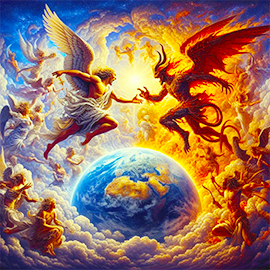
He created evil to give this option first to the Angels, resulting in the war between angels in the Heavens, where one-third of the angels decided to go their own way, choosing not to follow God. They were forcefully evicted from Heaven (Revelation 12:7-8).
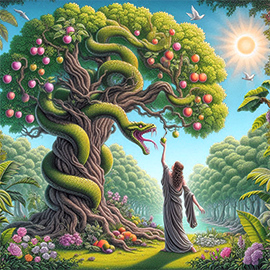 Then having created evil to honor the angels with the choice between good and evil, He subsequently planted the Tree of the Knowledge of Good & Evil in the Garden for mankind to have the same option (Genesis 2:15-17).
Then having created evil to honor the angels with the choice between good and evil, He subsequently planted the Tree of the Knowledge of Good & Evil in the Garden for mankind to have the same option (Genesis 2:15-17).
That was the fall of Man. The difference between mankind and the angels is that God implemented a plan of salvation for mankind. Not so, for the fallen angels.
Let us test this against Scripture, as is wise and instructed (Acts 17:11; 1 Thessalonians 5:19-22).
1. God’s Nature and the Creation of Evil
The Bible shows us and declares that God is entirely good, just, and righteous:
- Psalm 100:5 —For the Lord is good and his love endures forever;
his faithfulness continues through all generations. - James 1:17 — Every good and perfect gift is from above, coming down from the Father of the heavenly lights, who does not change like shifting shadows.
Given these verses, how can we reconcile God’s goodness with the existence of evil? The answer comes with understanding the essence of God, the nature of free will, the necessity of choice, and the aspects of both invisible and manifest evil.
2. The Necessity of Choice
He endowed mankind with free will and with reason — the ability to choose between different options. Free will is essential for a genuine relationship with God, as love and obedience that are not freely chosen would be meaningless.
God desires that we choose Him and all that is good. However, for this choice to be meaningful, there must be an alternative—another way different from God and all that is good. This alternative is what we identify as evil. If everything were inherently good, choosing God would not involve a real decision, as there would be no other option.
- Deuteronomy 30:19 — This day I call the heavens and the earth as witnesses against you that I have set before you life and death, blessings and curses. Now choose life, so that you and your children may live.
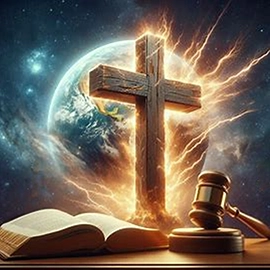 In this passage, God presents the Israelites with a clear choice: life and blessings or death and curses. By creating these alternatives God allows us to decide between good and evil.
In this passage, God presents the Israelites with a clear choice: life and blessings or death and curses. By creating these alternatives God allows us to decide between good and evil.
Please do not be mistaken: He will honor whatever choice we make (Remember a choice not for God, who is all-good, is a choice for not-good). To not choose is to make a choice not for God. The choice between life and blessings, death and curses, or good and evil, is a real choice and God will honor it for each and every individual.
3. God Created Evil Out of Love
A crucial aspect of understanding why God allowed the existence of evil is recognizing that it stems from His love. God does not want us to choose Him out of obligation, fear, or coercion. He desires that our choice to love and follow Him be made freely, as a genuine expression of our will.
Love, by its nature, must be freely given and freely received. If there were no alternative to God and good, our love for Him would be more akin to a programmed response than a genuine act of devotion. By allowing evil as an alternative, God ensures that when we choose him, we do so out of a sincere desire to embrace his love and to give him our love in return.
- 1 John 4:19 — We love because he first loved us.
The above verse encompasses the idea that our love for God is predicated upon his love for us.
- 1 John 4:8 provides, Whoever does not love does not know God, because God is love.
God’s creation of a real alternative to himself and all that is good, is an expression of His desire for our love to be genuine; a love that is chosen rather than compelled.
4. The Creation of Evil: A Scriptural Perspective
One of the most discussed verses regarding God’s role in creating evil is found in the book of Isaiah:
- Isaiah 45:7 — I form the light and create darkness, I bring peace and create disaster; I, the Lord, do all these things.
People argue that this verse does not, specifically, use the word evil (although it does in the King James Authorized Version) and that is factually no argument at all. Disaster, calamity, chaos, or any other synonyms used in the various translations, are ALL the opposite of good… And the opposite of good is what? Yes. Evil.
An opposing thing is necessarily an option; another way. To have the ability to make a choice, one must have more than one option. Because God is all good and his essence is love, what must he have had to do to create a choice other than himself? Yes; he had to establish not-good — He had to create evil.
5. Evil as an Invisible Force Made Manifest
Evil, in its essence, can be understood as an invisible force — a potential for opposition to God’s goodness. It is made visible or manifested through actions arising from that opposition.
The Bible provides support for this understanding by emphasizing that God created all things, both visible and invisible:
- Colossians 1:16 — For in him all things were created: things in heaven and on earth, visible and invisible, whether thrones or powers or rulers or authorities; all things have been created through him and for him.
This verse highlights that everything in existence, whether seen or unseen, was created by God. Evil, as an invisible force, is manifested through the actions that bring it into the visible world.
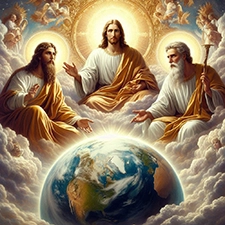 This concept is supported by the fact that God created everything that is made, as emphasized in the Gospel of John:
This concept is supported by the fact that God created everything that is made, as emphasized in the Gospel of John:
- John 1:1-3 — In the beginning was the Word, and the Word was with God, and the Word was God. He was with God in the beginning. Through him all things were made; without him, nothing was made that has been made.
The above verses affirm that nothing exists outside of God’s creative will. This includes the force for evil as an alternative to good.
6. Jesus as the Word Made Flesh
The same chapter in John further reveals that Jesus is the Word of God who became flesh. This underscores that God’s creative power is not just abstract but deeply personal and incarnational:
- John 1:14 — The Word became flesh and made his dwelling among us. We have seen his glory, the glory of the one and only Son, who came from the Father, full of grace and truth.
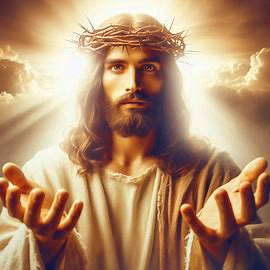 Jesus, the Word made flesh, represents the ultimate manifestation of God’s goodness and truth in the world. In contrast, evil represents the absence or opposition to this divine goodness. These are the choices God allows humans by providing the gift of free will: Good or Evil.
Jesus, the Word made flesh, represents the ultimate manifestation of God’s goodness and truth in the world. In contrast, evil represents the absence or opposition to this divine goodness. These are the choices God allows humans by providing the gift of free will: Good or Evil.
7. Understanding the Terms “Different” and “Another” in the Original Languages
The concept of choice inherently involves differences between options. In exploring the idea that God created evil as a “different” choice from good, it is helpful to look at the terms for “different” and “another” in the original biblical languages.
- Greek:
- Different: The word heteros (ἕτερος) means “another” or “different in kind,” indicating a qualitative difference between two things.
- For example, in Galatians 1:6-7, Paul uses heteros to describe a “different” gospel.
- Another: The word allos (ἄλλος) means “another of the same kind,” often used to describe something similar or of the same nature as the original.
- For example, in John 14:16, John uses allos to show that Jesus promises to have The Father send another advocate – The Holy Spirit – the same in nature and essence as Himself: God.
- Different: The word heteros (ἕτερος) means “another” or “different in kind,” indicating a qualitative difference between two things.
- Hebrew:
- Different: The Hebrew word shoneh (שׁוֹנֶה) can mean “different” or “altered,” derived from the root shanah (שָׁנָה), which means “to change” or “to be different.”
- Another: The Hebrew word acher (אַחֵר) means “another,” and can refer to something of the same or different kind, depending on context. However, it often implies an alternative option.
- Aramaic:
- Different: The Aramaic word shekhina (שְׁכִינָא) can be used to imply difference or diversity, often in contexts relating to contrast or opposition.
- Another: The Aramaic word akhyana (אַחְיָנָא) is used to denote “another,” typically meaning another of the same kind, similar to its Hebrew counterpart acher.
So, to supply us with free will, God had to make an option, an alternative to Himself. As he is all good and every good thing comes from him, it necessitated creating evil to give us a choice other than himself.
Because mankind has a propensity – or maybe proclivity is the better word – for choosing not good, he devised the plan of salvation by sending another, of the same sort as himself. He did this to offer us another choice; the free will exercise of choosing Jesus Christ for the propitiation of sin and the indwelling of the Holy Spirit, or to go our own way and be eternally separated from God and all that is good.
8. Theological Implications
Theologically, the idea that God created evil to provide a genuine choice for his created beings underscores the importance of free will in the divine plan. Without the possibility of choosing evil, choosing good (and thus, choosing God) would be meaningless. This understanding aligns with the Christian doctrine that God desires willing followers who choose to love and obey Him out of their free will, rather than compulsion.
Moreover, through the existence of evil, God expresses His love most profoundly. He desires our love not as a forced obligation but as a free, willing response to His love for us. The existence of evil, therefore, is a necessary condition for the authenticity of our love for God.
Furthermore, the existence of evil also serves as a backdrop against which God’s goodness, grace, and redemption can be more fully appreciated. Through the existence of evil, God’s love and mercy are demonstrated in the ultimate sacrifice of Christ, who redeems humanity from the consequences of evil.
9. Conclusion
The idea that God created evil to give us free will is complex and can be difficult to grasp, but it is a crucial aspect of understanding the biblical worldview. By allowing the existence of evil, God provides humanity 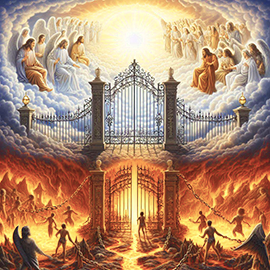 with a real choice, which is necessary for true love and obedience. And make no mistake, He will honor your choice for an eternity with Him, or separated from Him.
with a real choice, which is necessary for true love and obedience. And make no mistake, He will honor your choice for an eternity with Him, or separated from Him.
There are bad, evil, people in the world. They, too, have exercised their free will and God is bound to honor that choice. They choose to go a different way than God, but for everyone else, He has provided a way for us to choose an eternity with Him and all that is good. This is another form of our God-given free will:
- Choose to have the sacrifice Jesus made pay for our sins, or choose to go a different way and pay for our sins by enduring eternal separation from God and all that is good.
Scriptural support, coupled with an understanding of the original language terms for “different” and “another,” helps clarify this concept and underscores the depth of God’s plan for human free will and moral responsibility.
The presence of evil as an invisible force made manifest through action further deepens our understanding of free will. The choices we make have real, tangible consequences.
Ultimately, God wants us to choose Him and all that is good. He provides the alternative, however, to ensure that every individual is free to decide what they will. And He guarantees to honor either choice.
So? The choice is entirely yours. I pray you have made – or will make – the right decision for the eternity that will be yours.
Thanks for your interest in growing your relationship with God.
May God Keep & Bless You &Yours, Always,
John
Founder of TruthsOfFaith.com
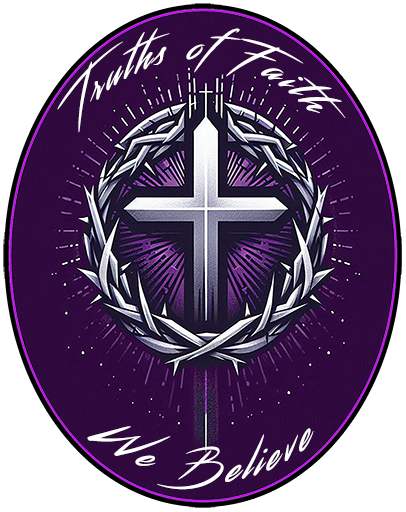
This article presents a thought-provoking discussion on the complex question of why God might have created evil. The author, John, emphasizes that evil exists to provide humans with true free will, allowing us to genuinely choose between good and evil. The piece highlights the importance of understanding God’s nature, free will, and the purpose of creation. John’s perspective underscores that God desires a relationship based on freely given love, rather than compulsion. It’s a compelling read that invites deeper reflection on the role of choice in our spiritual lives. What are your thoughts on this interpretation?
Why Did God Create Evil
Hello DaveR, It’s John,
I really appreciate your thoughts on the article and the fact that it compels you (and others) to engage in deeper reflection on the role of choice in our spiritual lives…
For a deeper look at other topics, please follow the following links: Building & Strengthing your Faith, Forgiveness, Grace, Love, Hope, and Wisdom.
Thanks for your interest in growing your relationship with God through uncovering His truths.
May God Bless & Keep You & Yours, Always,
John
Founder of TruthsOfFaith.com
I thoroughly enjoyed your exploration of Isaiah 45:7 and the nuanced perspectives on the creation of evil. It sparked a few questions I’d love your thoughts on:
1. How does the concept of free will intertwine with the theological discussion of God and evil as outlined in your article?
2. Could you delve into the historical evolution of how different theological scholars have interpreted Isaiah 45:7 over the centuries?
3. How does your analysis clarify how God’s sovereignty over evil impacts our understanding of moral responsibility and divine justice?
Your article provides a valuable deep dive into complex theological ideas, enriching our understanding and prompting reflective thought.
Thanks for such an insightful read!
Warm regards,
Gabriel John
Why Did God Create Evil
Hello Gabriel!
Thanks for your interest and your questions (which, by the way, are deep enough to involve an entire article for answering — but I will try to keep it as concise and short as possible herein).
I guess to answer all 3 of your relevant, deep, and considered, questions, I would start by telling you that there are a lot of seminary-trained Ordained Ministers, Theologians, and/or PHDs who believe that God is sovereign over evil, but who are not willing to accept that He did, in point of fact, create it.
They also believe in Hermeneutics in bible study — which involves 4 main steps:
1) understanding the historical and cultural context.
2) understanding the literary context.
3) making observations
4) drawing application.
Then there are those who practice the exegesis method of studying text:
1) critical explanation or interpretation of a text
2) when the text is scripture, whether verses, chapters, or books of the Bible, it is Biblical Exegesis
Hermeneutics, by necessity, encompasses biblical exegesis and both forms of study incorporate interpretation of the text.
This is the practice of understanding the circumstances, the times, the cultures, and the languages, of the people who scripted the verses – please note that I did not say they wrote the verses – as well as non-believers, opposers, combatants; and people depicted in the stories and instructions in general.
Theologians, in general, all agree that if there is a single contradiction in the bible, the entire contents of the Bible and, therefore, the plan of salvation, is a lie.
Both types of study lean heavily on interpretation, and this is where I have an issue. I believe the bible is to be obeyed and not interpreted, and here is why:
I believe the Bible, the Prophesies – and unfolding history – prove God’s essence/attributes/truths:
Love: God is love, and I believe this to be the chief attribute from which all else flows. Omnipotent: God has unlimited, all-power.Sovereign: God is the supreme authority over the universe and all created beings.Preeminent: God is above all other things and beings.Omniscient: God knows everything, including the past, present, and future.Wisdom: God has all knowledge and experience. His Wisdom is immutable, eternal, and his to freely offer believers. Wise: God has all knowledge and experience. His Wisdom is immutable, eternal, and his to grant believers.Omnipresent: God is present everywhere, at all times.Immanent: God is involved in, permeates, and maintains, every aspect of creation.Immutable: God never changes; His promises are sacrosanct. He will keep every promise delivered.Eternal: God is, always has been, and always will be: God has no beginning nor end.Infinite: His Being, Existence, and Perfection are limitless and endless.Faithful: God is loyal to his promises: He will keep them all.Righteous: His judgments are faultless, fair, and immutable, in relational justice, retributive justice, and reflective justice. His judgment is impeccable, perfect, and sacrosanct; they are immune from criticism or violation.Holy: God is perfect, morally pure, uncontaminated. There is no impurity in him. His is perfect and excellent in righteousness.God Cannot Lie.
Theologians are in complete agreement with all the above.
So, it is beyond me how they have trouble taking the bible at face value. For instance, there are a lot of people who believe there are lost books of the Bible that should have been included but weren’t found in time…
Since God is all-powerful and created every nook and cranny; every shadow, and illuminates everything and is the giver and sustainer of all life; since he is the possessor of all knowledge and nothing can be hidden from him… does it not automatically follow that if he wanted anything found, at any time; if he had wanted anything included, that it would have been so?
Would not this Omnipotent, Omniscient, Omnipresent, Being, have been able to have everything included at the time of the compilation of the Written Word and Instructions for His people?
The Bible declares that all scripture is God-breathed (2 Timothy 3:16). This means that God is the author, and man is only the transcriber (much like a stenographer in a court). The prophets, the apostles; the transcribers of what God wanted to be compiled, for the instructions and well-being of his people, were guided, inspired, and regulated by Al-mighty God.
He created the universe and everything that is. Does it not stand to reason that He was perfectly capable of getting his message to his people, with nothing left out and nothing added?
Interpreting God’s Word actually means that we are trying to figure out if God meant what he literally said, was accurate in describing events, or it proves that he was unable to get his message to us in a manner we could understand and embrace — it infers that God needs the help of mankind to give meaning and veracity to the words he delivered.
I am in disagreement with interpreting God. I am certain we should obey God, and scripture is in agreement with this stance.
Scripture says obedience is better than sacrifice (1 Samuel 15:22).
Additionally, Scripture declares that the heart of mankind is deceitful and wicked and that only God can know it (Jeremiah 17:9-10)
I am a simple man and Paul described the gospel as the Simplicity of Christ (2 Corinthians 11:3).
God said it. I believe it. I know and have lived out both sides of, “If I obey God’s Word, I will have strength, and peace, and honor, and integrity, and love, and when I do not obey God’s word, I find myself at odds with myself and the world, uncertain and miserable within, and abusive to myself and others, because of interpreting the Words of God to men, in ways other than what He actually said.
I know this is a long answer, and I will probably write an article to address this further (please look for it in the near future), but I have other articles that you might be interested in as well: Building & Strengthing your Faith, Forgiveness, Grace, Love, Hope, and Wisdom.
Thanks for your interest in growing your relationship with God through uncovering His truths.
May God Bless & Keep You & Yours, Always,
John
Founder of TruthsOfFaith.com